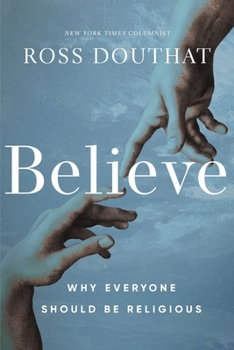New Book Makes Compelling Case for Religious Faith

Rumors of the death of God have been greatly exaggerated, to paraphrase the famous Missourian Mark Twain. As recent studies of faith in America show belief remains resilient despite cultural changes. More atheists are rediscovering faith than ever before.
A decade or more ago, the New Atheism of authors such as Richard Dawkins, Sam Harris and Christopher Hitchens was on the ascent. Despite their best efforts, however, research indicates strong faith contributes to positive outcomes. Even Dawkins, the committed British atheist, made headlines when he called himself a cultural Christian.
“I’m not a believer, but there is a distinction between being a believing Christian and a cultural Christian,” he said. “I love hymns and Christmas carols, and I sort of feel at home in the Christian ethos, and I feel that we are a Christian country in that sense.”
READ: Why the new Atheists failed
 Ross Douthat, a columnist for the “New York Times” has a simple explanation for why religious belief has outlasted its critics: “The basic justifications for a religious worldview are readily accessible to a reasonable human being.” His new book has garnered significant attention from religious and secular readers alike.
Ross Douthat, a columnist for the “New York Times” has a simple explanation for why religious belief has outlasted its critics: “The basic justifications for a religious worldview are readily accessible to a reasonable human being.” His new book has garnered significant attention from religious and secular readers alike.
Douthat is the author of “Believe: Why Everyone Should Be Religious,” which has climbed to number eight among hardcover nonfiction books on the New York Times bestseller list. The key word in the title is “religious.” Unlike many books about apologetics, Douthat first makes the case for why it is reasonable to have a religious worldview in general before turning his attention to Christianity in particular.
“The dividing line in American religious life is no longer between Christians and non-Christians but between people who accept some kind of spiritual reality and those who don’t,” he said.
Join us on a Biblical Tour! Learn More.
The first seven chapters of the book discuss why a purely materialistic view of the universe and human beings is inadequate, and why being religious is an intellectually defensible position.
“The apparent order of the universe, the ability of human consciousness to recognize and interpret this order, and the persistence of spiritual or supernatural experience are evidence for taking seriously a nonmaterial plane of existence,” he said.
The nature of the material world and how it is finetuned to support human life point to a creator. “The first blow to the idea of an indifferent cosmos was the twentieth-century realization that our universe appears to have a specific beginning, a point of origin prior to which not only space but time itself did not exist,” Douthat said.
Far from disproving the supernatural, an objective look at recent scientific advances makes a strictly material universe appear less likely. As new research shows, faith and science are not incompatible belief systems.
“So the long arc of science, which initially seems to bend away from religion by undermining certain specific scriptural or dogmatic claims, bends back by confirming humanity’s unique position in a universe strangely suited to both our bodies and our minds,” he said.
The next step is toward a religious worldview. Again, Douthat first makes the case for religion in general as the beginning of a path to the God of the Bible.
“If some kind of God exists and ordered the universe for human beings, then even a false or flawed religion will probably contain intimations of that reality, signposts for the discerning pilgrim, some kind of call to higher things — such that a sincere desire to find and know truth can fail to reach truth’s fulness and still find its reward,” he said.
Although not all religions are true, they nevertheless can carry elements of truth that can point seekers in the right direction.
“I think the orthodox Christian (or any believer in the specific truth of a particular region) has to assume both that the divine meets us where we are, even using the imagery and symbolism of other faiths, and also that there is a little more mystery to the supernatural realm than even a theological system founded on divine revelation can completely capture,” Douthat
said.
After carefully making the intellectual case for religion, in the final chapter Douthat shares his personal journey from New England Episcopalian to charismatic evangelical to Roman Catholic. Although other religions may contain certain truths, biblical Christianity is in a category of its own.
“In the end, I think that God has acted in history through Jesus of Nazareth in a way that differs from every other traditional and experience and revelation, and the gospels should therefore exert a kind of general interpretive control over how we read all the other religious data,” he said. “The triumph of the Christian message instantiates a profound revolution in the moral and spiritual order of the world, one so profound that two thousand years later, it’s still taken for granted, treated as bedrock, by many people who imagine themselves to have left Christianity behind.”
After establishing why it is reasonable to believe in religion in general and Christianity in particular, Douthat concludes by encouraging readers to move beyond mere belief to a saving faith.
“For the time being, we are given warning after warning to not let this moment go to waste – because our life could be demanded of us at any moment, because at the hour we least expect the Master could unexpectedly return,” he said.
“Believe: Why Everyone Should Be Religious” is available from most bookstores and online retailers or from Zondervan.
–Alan Goforth | Metro Voice






